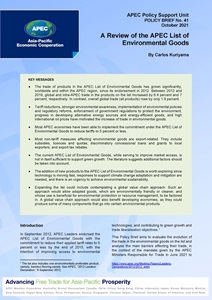A Review of the APEC List of Environmental Goods

| Published Date | October 2021 |
|---|---|
| Type of Publication | Reports |
| Publication Under | APEC Secretariat, APEC Policy Support Unit |
| Accessed | 5098 |
| Pages | 10 |
| Download publication | Download |
Description
Key messages from this policy brief are:
- The trade of products in the APEC List of Environmental Goods has grown significantly, worldwide and within the APEC region, since its endorsement in 2012. Between 2012 and 2019, global and intra-APEC trade in the products on the list increased by 6.4 percent and 7 percent, respectively. In contrast, overall global trade (all products) rose by only 1.9 percent.
- Tariff reductions, stronger environmental awareness, implementation of environmental policies and regulatory reforms, enforcement of government regulations to protect the environment, progress in developing alternative energy sources and energy-efficient goods, and high international oil prices have motivated the increase of trade in environmental goods.
- Most APEC economies have been able to implement the commitment under the APEC List of Environmental Goods to reduce tariffs to 5 percent or less.
- Most non-tariff measures affecting environmental goods are export-related. They include subsidies, licenses and quotas; discriminatory concessional loans and grants to local exporters; and export tax rebates.
- The current APEC List of Environmental Goods, while serving to improve market access, is not in itself sufficient to support green growth. The literature suggests additional factors should be taken into account.
- The addition of new products to the APEC List of Environmental Goods is worth exploring since technology is moving fast, responses to support climate change adaptation and mitigation are needed, and there is an urgency to achieve environmental sustainability.
- Expanding the list could include contemplating a global value chain approach. Such an approach would allow adapted goods, which are environmentally friendly or cleaner, and whose use is beneficial for environmental protection or resource management, to be factored in. A global value chain approach would also benefit developing economies, as they could produce some of many components that go into certain environmental products.

